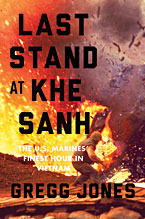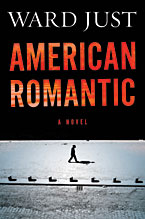 |
||||||||||||
|
Books in Review, July/August 2014 The Last Time I Dreamed About the War: REVIEWS BY MARC LEEPSON
The Last Time I Dreamed About the War: Essays on the Life and Writing of W.D. Ehrhart (McFarland, 296 pp., $29.95) contains twenty-one in-depth and revealing pieces on Ehrhart’s life and work. The book’s editor, Jean-Jacques Malo, an English professor at the University of Nantes in France, has put together work from a wide assortment of scholars and poets, most of whom are military veterans and academics. That includes Donald Anderson, the long-time editor of the U.S. Air Force Academy journal, War, Literature & the Arts; Jan Barry, the Vietnam Veteran poet, journalist, and activist; Robert Doyle, a Navy Vietnam veteran who specializes in writing about POWs; Dale Ritterbush, an English professor best known for his Vietnam War-influenced poetry; and David Willson, whose review of Vietnam War poetry appears in this issue. Ehrhart is “a poet who writes essays,” Willson notes. That’s one reason, Malo contends, that Ehrhart is not better known. Ehrhart, Malo writes, “does not have the reputation of Vietnam War fiction novelists such as Tim O’Brien or Larry Heinemann. This is partly due to the fact that Ehrhart does not write fiction, that poetry is read by a minority of people, and that memoirs interest a small readership, just like essays.” Ehrhart, Malo says, “does not conform to” the idea of “what a Vietnam War author is for the general public, as well as for commercial publishers.” What’s more, “since Ehrhart came back from the war, he has voiced his opinions about government positions he disapproves of, as well as all sorts of other topics. For many he does not tell the ‘right’ story, the one which would look good.” That’s why, Malo suggests, Ehrhart “sits on the edge of fame—although he is revered in academia.” This book is filled with academic reverence for Ehrhart’s work. That is not a bad thing, as very often those words are illuminating and insightful. Take, for example, the concluding sentences of Doyle’s essay: “Some Vietnam veterans lost their sense of patriotism; some say nothing; others, like Bill and me, are teachers and cannot live our personal and professional lives in silence. We soldier on, knowing that we are the authentic voices.”
Jones, best known for his book on the Philippine War, Honor in the Dust, treads where other histories of Khe Sanh have gone before as he chronicles the siege’s brutal on-the-ground action as well as its bigger-picture strategic issues. Jones, however, gives but cursory attention to the larger picture—who won, who lost, and why. “Definitive answers” to questions such as the NVA’s true objectives at Khe Sanh, he says, “will likely remain elusive.” Instead, Jones concentrates on telling the personal stories of the American Marines in the trenches. He does so by effectively using interviews he conducted with American survivors and weaving them into a readable narrative that also uses facts and figures from secondary sources and official records. This informing book serves as a testament to the Khe Sanh Marines who, as Jones puts it, “heeded the call of their duly constituted leaders” and “went to Vietnam with the best of intentions,” earning “a place of honor in American history.”
I have just read my third Just, American Romantic (Houghton Mifflin Harcourt, 265 pp., $26), and my reaction was the same as it was to the other two, The American Blues and A Dangerous Friend: Just is a very good writer, but his plots are not compelling and his characters are, in the main, unsympathetic and bland. In The American Blues (1984) Just told the story of a middle-aged ex-journalist haunted by his experiences in Vietnam during the war. Just spent the bulk of the book zeroing in on his hero’s introspective brooding, which didn’t exactly make for scintillating reading. In A Dangerous Friend (1999) Just’s title character is a thirty-something American looking for adventure who signs on with an NGO and sets out to win hearts and minds in South Vietnam circa 1965. The results are predictable in a novel I found humorless and cold. American Romantic starts in Vietnam circa 1965. (Just does not offer specifics about dates and, oftentimes, names and places.) The story chronicles the career of a youngish Foreign Service officer who goes on a dangerous mission that ends very badly—and that haunts him the rest of his days. He also has a brief love affair in Vietnam with a beautiful German nurse that also ends badly. Memories of Sieglinde remain with him for the rest of his long life. Once again, Just offers a plot that did not draw me in. Except for a harrowing adventure in the jungle, the book contains little action, precious little humor, and a plot that desultorily spins out to an unsurprising conclusion.
|
||||||||||||
|
|
||||||||||||
|
||||||||||||
8719 Colesville Road, Suite 100, Silver Spring. MD 20910 | www.vva.org | contact us |
||||||||||||











